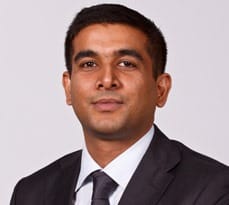Think marketing is all about long lunches and creative flourishes? Think again. Clear-minded business awareness is just as important as an eye for what makes a good poster, as our panel of experts and Cambridge MBA alumni can testify.

The industry expert – Joseph Liu
A career consultant and branding specialist with a degree in psychology, an MBA, and 10 years of brand strategy experience marketing products for both small start-ups and Global Fortune 500 companies, Joseph gives specialist coaching to MBA students to enhance their personal branding and career development opportunities.
Do I have what it takes to succeed in marketing?
The industry expects four key skills: thought leadership – the ability to look at a project and share your unique perspective to push ideas forward; cross-functional acumen –an understanding of functions outside of marketing (operations, finance, sales) to be able to successfully navigate across an organisation; initiative – the drive to be proactive and involved separates the great interns from the good interns; and critical thinking – the ability to break issues down into smaller parts and look at them analytically.
What skills do I need?
A common misconception is that marketing is all about creative ad campaigns. However, to succeed, you need hard skills such as numerical analytics – you need to be able to digest and understand a lot of data including quantitative consumer research, market data and sales figures. You also need the ability to carve up your budget in a sensible fashion and have financial acumen to consider the implications of your marketing initiatives on business performance. Throwing all your energy into sparkly marketing ideas that don’t drive profit will not get you very far. You need to apply a financial lens to everything you do.
What about soft skills?
Planning and organisation skills are vital, especially when managing timelines for particular products. You also need creative judgment. You don’t need to be a designer or an artist but you do need to be able to critically evaluate creative ideas to determine whether they support your brand strategy and unique selling proposition. You may be marketing products you don’t often buy yourself, so you must be able to objectively assess whether your messaging resonates with your target audience even if you don’t fall within that group yourself. And of course, you need people skills – you’re working across multiple functions, often managing a team, brand partners, external agencies. Being able to work effectively with people spanning various functions across your company is vital to success.
What are the challenges of working in marketing?
As is the case with many functions, you have to deal with a lot of politics, especially since some aspects of marketing are subjective. You might believe in an idea, but if a senior stakeholder doesn’t, you’ll struggle to drive it forward. Most large marketing organisations have set processes, so you may find yourself filling in a lot of internal templates to move an idea forward. Marketing has also become much more reactive since the advent of social media, which can accelerate the pace and cadence of your work. A few tweets could lead you to second-guess an entire campaign. So the ability to remain strategic & focused amidst the frenetic pace of social media is an invaluable skill.
What do I need to do next?
For MBA students to be successful and be true to your own vision and values, you should be clear on who you are and what you can offer. You need to be able to clearly, concisely and selectively summarise your career to date – both your technical skills and your soft skills. That’s the “backward-looking” part. Then you need to look forward and decide the professional impact you want to make. Think about your desired career legacy and what role after your MBA will help you achieve this. You need to build a compelling story summarising your professional history and future goals, then work out how the MBA can be a bridge between the two.
Alumnus – Himanshu Rai (Cambridge MBA 2012)
Himanshu had a 15-year global career in advertising behind him before he opted for the Cambridge MBA, and is now Regional Head of Strategy at WPP’s Blue Hive APA in Shanghai.

What’s the story?
I had already been in advertising for 15 years, working in India, Malaysia and London before I began an MBA at Cambridge, so I wasn’t looking for a career change. But I did want to complement my current skill set. I wanted to enhance my abilities in planning and in strategy, in particular. I wanted to focus on adding innovation and international business strategies to my skillset.
What did the MBA give you?
It enabled me to do more “upstream thinking”. I specialised in innovation and international business, as most of my jobs had been – and have been since – global in nature. The multicultural lessons we learned were fantastic, and every class was a case study. What impressed me most of all was the School’s approach to innovation. The MBA drills down deep across every aspect of the course – product, packaging, supply, retail, anywhere in the chain. As part of the Global Consulting Project I worked with Diageo plc to produce a Balanced Scorecard evaluation framework for its global innovations. The Balanced Scorecard knowledge I got from the MBA has completely changed the way I view challenges. It helped me to look at problems in three or four different ways and I still use it now in almost everything I do.
How has the MBA benefited your career?
Following the MBA I joined WPP and moved to Korea to lead the strategy development for all British American Tobacco brands. In August last year I moved to Shanghai to become regional chief strategy officer at Blue Hive, leading a team of 20 strategists building a marketing, brand and communication plan for 17 car brands for Ford and Lincoln across 19 Asia, Pacific and African countries – which is Ford’s priority region for sales and profitability. The markets are extremely diverse but Cambridge Judge’s concepts and frameworks gave me a wide perspective to global brand management and regional marketing planning.
Another challenge is that the brands need to continuously find new areas of innovation – but innovation was one of my key motivations for coming to Cambridge Judge and Professor Jaideep Prabhu’s frameworks from real-life case studies equipped me with a disciplined approach to innovation in different parts of the business. And of course there is the complexity of disparate business indicators available for each market – but that Balanced Scorecard approach I learned enabled me to use this in practical scenarios.
Alumna – Tina Fisher (Cambridge MBA 2004)
Tina is now the co-owner of Cape Town-based start-up Kaboose, a virtual beauty adviser, having completed her Cambridge MBA and been responsible for brand marketing across 17 different countries as an International Brand Manager at Pfizer in London, UK.
What’s the story?
I was working in sales in the pharmaceutical industry and felt I needed a broader knowledge of business. Having worked for seven years I wasn’t keen to go back to school for another two, so wanted a one-year course but at a globally recognised institution. I had worked in Canada for seven years but moved to the UK to go to Cambridge because of its multicultural mix of students and its fantastic links to the biotech innovations of Silicon Fen, as well as its proximity to London.
What did the MBA give you?
The MBA was the best thing I’ve ever done. You’re surrounded by such bright people from such a huge range of fields. Marketing has to be learned on the job but an MBA gives you knowledge of so many wider aspects of business. The strategic management skills have given me confidence and an understanding of the psychology of effective business. But aside from the theory, it is the people who make the Cambridge MBA such an incredible experience. For instance, I remember in one class we learned theory for 25 minutes – but the next 90 minutes was an open discussion on Chinese industry because the group included Chinese students with a wealth of experience in that area. You constantly learn from your fellow students. And the networking is invaluable – I’ve made so many contacts I could use, whether now or 10 years down the line.
How has the MBA benefited your career?
As soon as I graduated from Cambridge Judge I was offered a position with Johnson & Johnson. I was then appointed International Brand Manager at Pfizer in London, where I was responsible for brand marketing across 17 different countries. I then moved to South Africa, where I am now running a start-up in Cape Town called Kaboose, a virtual beauty adviser. All of these posts stemmed from the MBA – through Kaboose I have developed partnerships with some of South Africa’s largest multinational beauty and personal care companies.

